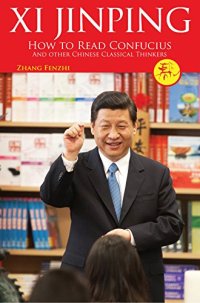
Ebook: Xi Jinping: How to Read Confucius and Other Chinese Classical Thinkers
Author: Fenzhi Zhang
- Tags: China, Asia, History, Non-US Legal Systems, Legal Theory & Systems, Law, Confucianism, Other Eastern Religions & Sacred Texts, Religion & Spirituality, Eastern, Buddhism, Indian, Taoism, Zen, Philosophy, Politics & Social Sciences, Political, Philosophy, Politics & Social Sciences, Asian, International & World Politics, Politics & Government, Politics & Social Sciences, Comparative Politics, Political Science, Politics & Government, Politics & Social Sciences
- Year: 2015
- Publisher: CN Times Books
- Language: Chinese
- epub
The most important private activity for Xi Jinping, Secretary General of the Chinese Communist Party, is reading. To him literature is vital for an individual's growth, particularly works of traditional Chinese culture and the philosophy of Confucius, with its focus on society, self-education, and governance. Having used the knowledge gained from his reading to achieve leadership of China, he encourages everyone around him to love and read good books. Xi believes that reading and learning are not only necessary requirements for good leadership, but for a healthy society generally. Accordingly, he has made reading the classics of Confucius and other thinkers a requirement for Party Leaders. In this collection respected journalist Zhang Fenzhi brings together Xi’s speeches, presentations, and writings about the importance of classical Chinese thought and the importance of literature and reading. In China, Xi explains, a major part of the cultural heritage is a “fine tradition of books consisting of ancient and modern masterpieces that are a reflection and expression of the fundamentals of human survival and development. This literary heritage,” he explains, “penetrates the wisdom of history. Its ideological value spans time and space being constantly refreshed, and in doing so has become all of mankind’s spiritual wealth. The best example of this is that we have a history of 5,000 years of Chinese civilization and the works that have come out of it contain a wealth of ideas about how to live the best life as well as the major principles of governance.” Readers will find this book is divided between general themes (National Governance, Self-Cultivation, Foreign Affairs, etc.) and with a classic quotation on the theme, Xi’s use of the quote, an explanation of his meaning in its use, as well as the work from which the original quote came, the original text, and a short biography of the author. Finally, Zhang provides an analysis of the use of the quote in the context of its historical meaning providing an explanation of Xi’s use and meaning. Authors quoted range from Confucius to Mencius to Mao.